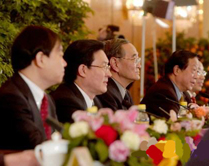
The non state-owned sectors have been playing an increasingly vital role in driving China's economic growth. And the country's top legislature is working to include provisions on protecting legitimate private property into its Constitution, and on supporting and guiding the growth of the non-state-owned sectors.
At a press conference held Tuesday in Beijing by China's top advisory body, the CPPCC, members said that the inclusion of these provisions would serve as a catalyst, as well as provide positive guidance for the development of the non-state sectors.
The amendments on protecting private property to be enshrined in the Constitution specify clearly the protection of "privately-owned" production and living materials.
The amendments signal for the first time in China that the legislature has put private property on an equal footing with state-owned property.
The amendments are sending a very positive sign to China's private entrepreneurs. Their legal interests and rights, as well as their endeavors to grow their businesses, will be fully protected by law. And these proactive efforts will be encouraged by the State.
According to Liu Jiachen, member of CPPCC National Committee, "The protection of private property will benefit private investment, and encourage people to accumulate wealth, and increase input to expand production. They will serve to promote the economy and help the State to become wealthier and stronger."
The CPPCC members also said the growth of the non state-owned sector would benefit the overall national economy.
Another CPPCC member Li Yining said, "The entry of non state sectors into market competition will give state-owned enterprises a sense of urgency, and force them to rely on technical innovation and reform to improve their performance. In the long run, this will be good for the growth of the state-owned sector."
At the ongoing NPC and CPPCC sessions, many delegates also held that the Constitutional amendments on protecting private property would also serve as an effective check on the behavior of a few overly aggressive or unscrupulous government employees, and others. Especially those that may attempt to abuse their authority, encroaching upon the legal interests of small, privately owned businesses.
Overall, the CPPCC members promoted the idea that the constitutional protection of private property would help create a safe environment for the healthy development of private businesses in China.
(CCTV March 9, 2004)
|

